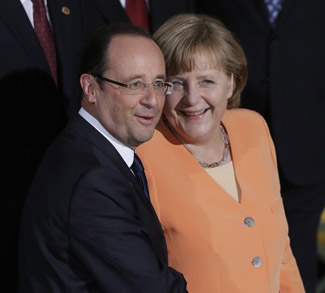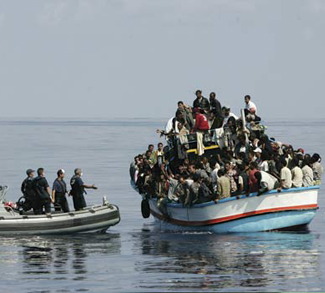Francois Hollande wants growth, Angela Merkel wants austerity. How has this simple contradiction managed to wreak havoc on global markets, and more importantly: is there any substantive difference between the two positions?
Long-term political observers might have noted that two peculiar words have entered the European lexicon of late. The first one is ‘austerity,’ a word born of Greek excess in the public spending sphere, excess that would have normally caused the country to default if not for the institutional framework that binds it to the rest of Europe. Broadly speaking, austerity has come to represent the absence of deficit spending, and in the European context this is synonymous with cutting social welfare programs such as healthcare, education, and other subsidies. It’s worth mentioning that austerity is also an ugly word in the more general sense. People are told to be austere either because they don’t have enough money or they’ve been too extravagant with the money they do have.
And then there’s the yin to austerity’s yang. ‘Growth’ is a newer arrival to the European political dialogue, having been re-launched in the course of Francois Hollande’s recent victory over his pro-austerity counterpart in France. Of course, growth is nothing new to us and many people around the world want their country’s GDP to grow- the question is, and always has been, how such a thing is accomplished. For Francois Hollande, growth is achieved by stimulating the economy with more government spending, thus bringing his policies into conflict with austerity, or so it would seem. Again, growth is something we all seek and is a word with sunny, positive connotations regardless of whether it’s used in a personal or national context. These positive connotations were what helped to sway the French population behind Francois Hollande when they were asked to choose between finger-waving austerity and bright-eyed growth.
So if European politicians are to be believed, we must choose between two mutually-exclusive policies: growth or austerity. But how does this overly simplistic view explain the fact that Germany, a country with an abnormally low deficit of one percent of its GDP, is the only European economy that grew (0.5%) in the first quarter of 2012? To contrast, France ran a deficit of 4.4 percent and reported economic stagnation over the same period. What’s more, even the harbinger of growth himself seems to have a soft spot for austerity, as Francois Hollande has committed himself to bringing French public spending within the Maastricht limit of 3.0 of GDP by 2013.
The austerity-growth dichotomy doesn’t stand up well to critical scrutiny because it’s merely branding meant for domestic political consumption. Austerity came first, launched as a response to very real loopholes in the institutional framework of the euro zone. Then came growth, a magic word that can be brandished to win elections. The dog and pony show even has an expiry date, at least in the case of France. The only reason that President Hollande has not already come around to unequivocally back Merkel’s legally-binding spending limits is that his party has a legislative election to win in June. After that, President Hollande will surely fall in line with the prevailing logic that fiscal union must accompany monetary union if the euro is to be long of this world. But perhaps French planners will have dug up a word to replace austerity by then; one that doesn’t sound so strict.
In the shadow of austerity-growth lies the real ideological battle for the soul of Europe, the one that dates back to Smith and Marx. The combatants may have shifted over the centuries- laissez-faire capitalism, socialism, communism, the welfare state, neoliberalism, fascism- but they have always championed different ideas about the relationship between individual, market, and state in society. This is the ‘real’ battle that will never really end, and neither austerity or growth fit into it; the former because it doesn’t venture an opinion on what the government should spend its money on (just that it should have the money to spend), and the latter because it’s total nonsense.
The real issue that European voters should be cognizant of doesn’t have anything to do with growth-austerity, or even the doldrums of the euro zone, which again could technically be solved if governments simply spent as much as they took in. Rather, it has to do with globalization, particularly an expanding global workforce, and the drag it has on Western standards of living. This global redistribution of wealth will create neoliberal political pressure to increase national competitiveness and cut into social welfare policies that much of the Western world takes for granted. Consequently, this will lead to democratic blowback that could rally itself under a variety of different flags, ranging from anti-immigration to protectionism to anti-EU, for it’s hard to predict how a population will react when they haven’t been informed what the real problem is.
Thus, we have an austerity-growth debate that has detached itself from reality and become election fodder and the real external pressures on the European way of life, two different conversations occurring in parallel. And strangely enough, the former may end up being more decisive. Europe is after all a democratic continent and the pro-growth anti-austerity message will continue to resonate with European voters. Angela Merkel’s Christian Democrat party recently suffered a crushing defeat at the polls in Germany’s largest state, and the anti-austerity Socialist Party seems poised for a big win in Dutch elections this September. Without even taking into account the festering situation in Greece, it is about to become exceedingly hard to advocate that the euro zone can keep itself together on the wings of voluntary fiscal responsibility and not a major new treaty.
Perhaps people will look back one day and comment on how it was ‘growth’ that ripped Europe apart.
The opinions, beliefs, and viewpoints expressed by the authors are theirs alone and don’t reflect any official position of Geopoliticalmonitor.com.




